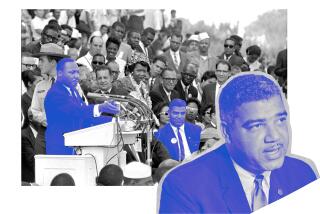Albert F. Canwell, 95; Anti-Communist Zealot
- Share via
Albert F. Canwell, a one-term Washington state legislator and anti-communist zealot who helped set the national stage for McCarthyism, has died at age 95.
Canwell died April 1 in his native Spokane of unspecified causes.
In 1948, Canwell conducted the first nationally publicized hearings into anti-communist activity, well ahead of Sen. Joseph McCarthy, whom he claimed to have befriended and tutored.
“I was helpful to [McCarthy] in selecting targets. He wasn’t the expert I was [in 1948] but he was a quick learner,” Canwell told the Seattle Post-Intelligencer in 1998, the 50th anniversary of his notorious hearings.
As his own state Joint Fact-Finding Committee on Un-American Activities began to earn national attention, Canwell also visited California to tutor a committee that the state set up akin to Washington’s.
Canwell’s primary focus was the University of Washington. His red-baiting, iron-fisted “Canwell Committee” subpoenaed 40 professors and questioned 11 during five days of searing hearings in July 1948 in the former Seattle Armory.
Three professors--Ralph Gundlach, Joe Butterworth and Herbert Phillips--refused to testify and were held in contempt. All were fired and never taught again.
Gundlach, a social psychologist, spent 30 days in jail, then moved to New York, where he became a successful psychiatrist. He died in London in 1978.
Phillips, a philosophy professor, became a dairy farm laborer and dockworker, dying in San Francisco at age 56.
Butterworth, an English instructor, fell into alcoholism and poverty and died in 1970.
Ed Guthman, former national editor of the Los Angeles Times and now a professor of journalism at USC, won a Pulitzer Prize in 1950 for his stories in the Seattle Times vindicating another accused professor, Mel Rader, who wrote a book about his own experience, “False Witness.”
Canwell also questioned and, when they refused to testify, held in contempt Burton and Florence James, founders of the University of Washington area’s Repertory Playhouse.
Burton died of a heart attack shortly after the hearings, Florence was fined $125, and the theater closed--victims of the anti-communist crusade.
Canwell, who in 1997 provided the 400-page “Albert F. Canwell: An Oral History” available through the Washington secretary of state’s office, remained unrepentant.
“There was no time that we went overboard. I didn’t accuse anybody who wasn’t guilty as hell,” he told the Spokane Spokesman-Review in 1998.
“Well, as far as I’m concerned, I’d do it the same way. I might have even been a little harsher on those individuals. I have no apologies,” he told the Seattle Post-Intelligencer that year.
And for the Seattle Times, he added: “I haven’t any desire to be remembered or not be remembered. I came and left. I did the job the way I think I’d do it again.”
Canwell grew up around Spokane, working on eastern Washington’s farms and orchards.
After dropping out of Gonzaga University, he became an itinerant journalist during the Depression, working in Yakima, Spokane and elsewhere.
While reporting on labor strikes, he became convinced that Communists were taking control of unions and began keeping files on people he suspected.
He stepped up his surveillance when he joined the Spokane Sheriff’s Office and worked with other local and federal agents on the “Red Squad” tracking radicals.
Canwell had no intention of becoming a politician, but after a “somebody ought to do something” chat with his friend, Spokane Spokesman-Review columnist Ashley Holden, he found himself mentioned in Holden’s column as a candidate for the state Legislature.
A Republican in a Democratic district, he did not expect to win, spent little on his campaign and kept his promises simple: no new taxes and “do something about the communists in Washington state.” He won.
Once the Joint Fact-Finding Committee on Un-American Activities was established in 1947, Canwell became its obvious chairman.
Although his single four-year term gained Canwell widespread and enduring fame--or infamy--it did not launch a long political career.
He stood for election four more times--to the state Senate, the U.S. Senate and the U.S. House of Representatives--but never won, despite campaign help from such figures as the young U.S. Sen. Richard M. Nixon.
Canwell went home to Spokane and spent the remainder of his working life running a private security business and a bookstore.
More to Read
Sign up for Essential California
The most important California stories and recommendations in your inbox every morning.
You may occasionally receive promotional content from the Los Angeles Times.













